The Invention
Since the expansion of the Dutch deposit system on April 1, 2023, cans and small plastic bottles have also been included in the mandatory collection scheme. While this is a positive step toward higher recycling rates, it also presents practical challenges for businesses, institutions, and other professional environments—such as contamination, unpleasant odors, and sticky situations when collecting and storing deposit containers.
To support organizations in efficient and hygienic collection, we developed the Recyco Deposit Bag: a sealable, foldable, and reusable bag that makes separating and storing deposit packaging simple, clean, and practical. This solution contributes to a cleaner working environment and aligns with broader sustainability goals such as waste reduction, behavioral change, and water conservation. With the Recyco Deposit Bag, you offer employees, customers, or visitors a user-friendly way to handle deposit packaging responsibly.
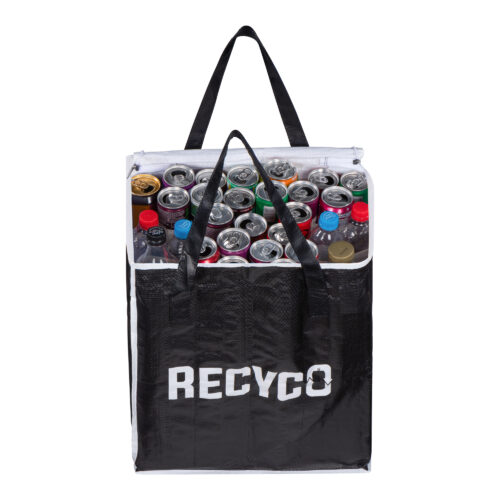
The Launch
Since its official launch in September 2024, the Recyco Deposit Bag has been actively rolled out in the Netherlands, Germany, and several Scandinavian countries. Our growth strategy focuses on collaboration with local partners, municipalities, retail chains, and community organizations to integrate the bag into both private households and public or professional settings.
What started as a consumer-oriented solution is now evolving into a widely recognized and practical standard for clean and efficient deposit collection. Businesses, educational institutions, municipalities, and other organizations immediately benefit from a hygienic and logistically sound approach.
With proven impact in multiple regions, we are gradually expanding our activities to other European countries with active deposit systems. Our goal is clear: to offer a scalable, cost-efficient, and sustainable solution to organizations and communities committed to waste reduction, behavioral change, inclusivity, and cleaner public spaces.
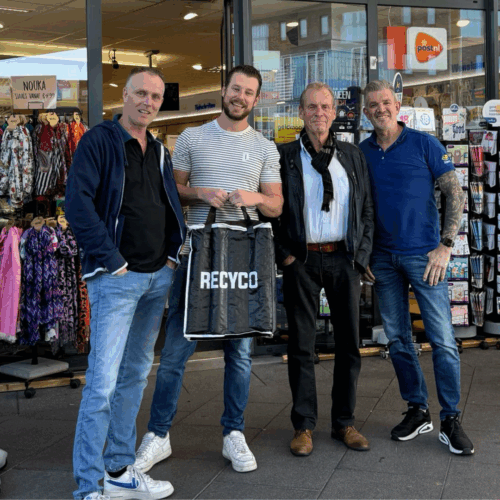
More Recycling, Fewer Barriers
Recyco positions itself as a strategic and social partner in addressing urgent environmental challenges. One of our core objectives is to support governments and implementing organizations in achieving the legal collection target: at least 90% recycling of beverage packaging.
In practice, hygiene, odor, and ease of use are key obstacles to the proper return of deposit containers. Recyco lowers these barriers with a practical, recognizable, and hygienic collection solution. The Recyco Deposit Bag makes the collection process easier and more appealing—at home, at work, and on the go—leading to structural behavioral change and increased recycling rates in municipalities, neighborhoods, and public spaces.
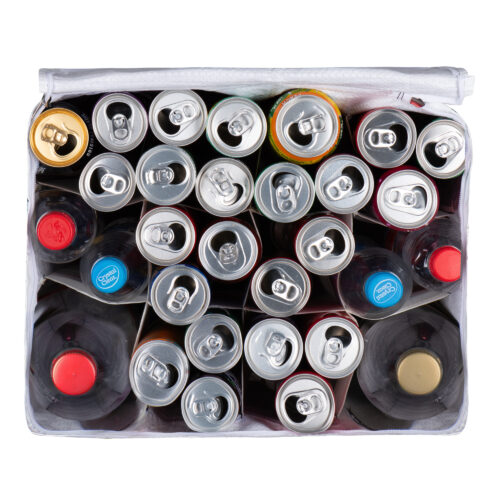
A Concrete Approach to Litter Reduction
Although the expanded deposit system has positively contributed to waste reduction, many cities have seen an increase in litter around waste collection points. Intensive collecting by deposit gatherers often results in torn garbage bags, overflowing bins, and polluted streets. This undermines municipal goals for a clean, safe, and livable environment.
Recyco offers an accessible and effective solution: by making the Deposit Bag widely available through community centers, schools, public transport hubs, and local shops, we create recognizable, portable, and hygienic collection points. This encourages residents and visitors to donate deposit containers directly and responsibly—either to charities, neighborhood initiatives, or directly to individual collectors. The result: cleaner streets, increased social engagement, and less litter.
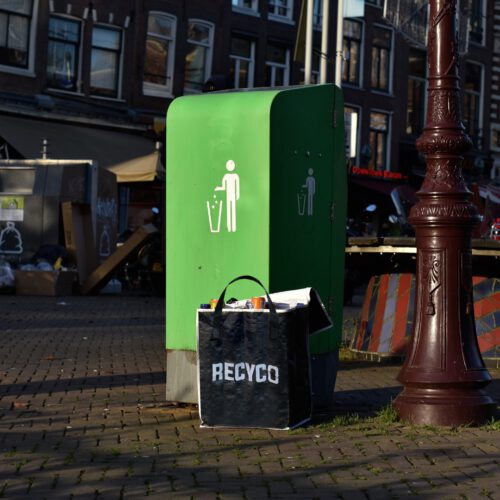
Support for Deposit Collectors
Recyco recognizes and supports the valuable role of deposit collectors—both individuals collecting out of economic necessity and citizens actively contributing to a cleaner environment. Often invisible or undervalued in public discourse, their efforts have a direct impact.
With the Recyco Deposit Bag, we provide this group with a functional tool and a recognizable visual identity. The bag makes it immediately clear: this person is contributing to recycling and waste reduction. This increases public appreciation and fosters social cohesion between collectors, residents, and business owners. In this way, we link sustainability with inclusivity—without municipalities needing to introduce additional regulations.
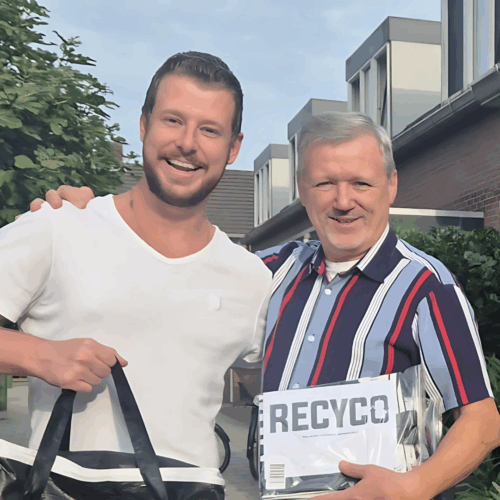
Saving Drinking Water Through Smarter Collection
Many consumers rinse deposit containers for hygiene reasons, resulting in millions of liters of unnecessary drinking water usage each year. The Recyco Deposit Bag offers a hygienic alternative in which packaging can be stored upright and sealed, without leaking or smelling. Rinsing is no longer necessary.
A concrete example: someone who rinses one can per day uses over 91 liters of water annually. If just 10% of households change this habit, more than 77 million liters of drinking water would be saved. Recyco prevents waste and raises awareness of the environmental impact of everyday behavior.
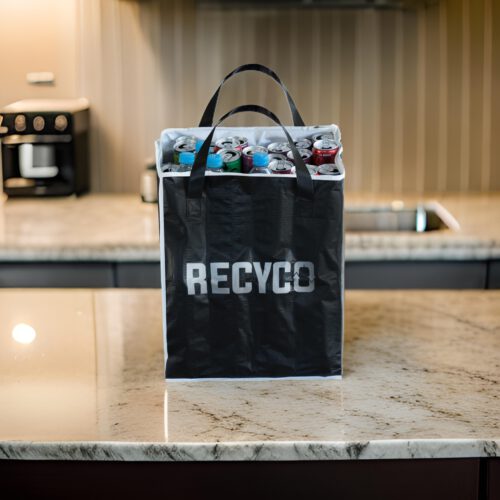
Accessibility for Everyone
For people with physical limitations—such as wheelchair users or the elderly—returning deposit containers often comes with additional challenges. Awkward or leaking bags make them dependent on assistance, which is often perceived as inconvenient or undignified.
The Recyco Deposit Bag offers a dignified and practical solution for this target group: the bag is sealable, hygienic, and easy to handle. By making it available in places such as community centers, care institutions, and neighborhood hubs, we increase self-reliance and involve more people in sustainable behavior—even those who might otherwise be excluded.
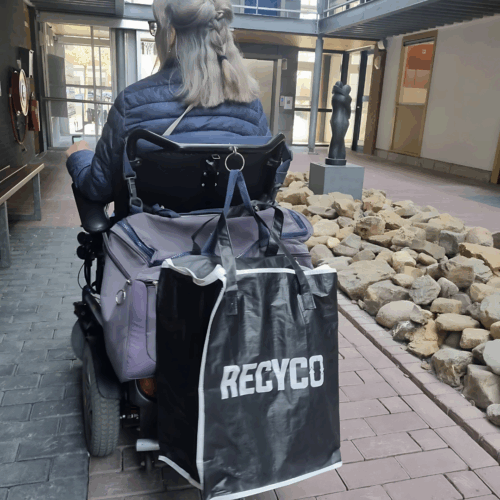
Working Together for Sustainable Impact
The Recyco Deposit Bag is a proven, scalable, and cost-efficient solution to today’s social and ecological challenges. We invite municipalities, NGOs, companies, and event organizers to partner with us.
Whether it concerns a pilot project, long-term collaboration, or direct distribution of the bags to residents or visitors—we think strategically and practically with you. Together, we realize behavioral change, waste reduction, and a more inclusive and sustainable living environment.




